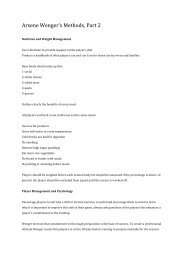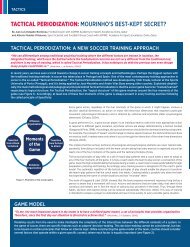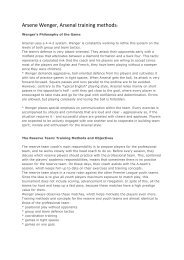Tactical Peroidization.pdf
- No tags were found...
You also want an ePaper? Increase the reach of your titles
YUMPU automatically turns print PDFs into web optimized ePapers that Google loves.
Principle of tactical fatigue & tactical concentration<br />
“Concentration needs to be trained. It can be done by training according to a specific philosophy. I cannot dissociate training<br />
intensity with the concept of concentration. When I say that soccer is made by actions of high intensity, I also refer to the need of<br />
permanent concentration; it is implicit to the game.” (Mourinho, in Amieiro et al, 2006)<br />
Soccer players’ peak performance requires a constant tactical thinking, both<br />
in game and in training. Players must concentrate. The development of a<br />
tactical attitude presupposes the development of an attitude to think and<br />
decide quickly. The mastery of specific techniques and the capacity for tactical<br />
decision-making depends on their suitability to the situation of a game.<br />
That means high levels of concentration from the first to the last minute of<br />
the game are essential. Therefore, the intensity is not an intangible concept;<br />
it is directly related to the principles and sub-principles of play, which, when<br />
trained through well-designed exercises, will lead a player’s future actions<br />
and thoughts. The more variables to be analyzed for the players during the<br />
execution of training exercises, the more demanding and intense will be the<br />
situation (Frade, 2003).<br />
Intensity will be different from day to day, as the complexity of training sessions<br />
varies (see Figure 8). We can exemplify the concept of relative maximum<br />
intensity as follows: A team played on Sunday, so the player on Monday and<br />
Tuesday is not fully recovered physically, mentally or emotionally. To be able<br />
to overcome all the challenges that Tuesday training session can require, the<br />
player should be working at a maximum intensity of concentration.<br />
That maximum intensity, however, will not be enough to overcome the increased<br />
complexity (and intensity) that the training tasks will demand on<br />
Wednesday and Thursday (a player’s recovery level from the game is higher,<br />
too). Therefore, from <strong>Tactical</strong> Periodization, the intensity is always maximal in<br />
terms of concentration, but relative to players’ recovery and readiness to train.<br />
The higher levels of concentration during the training exercise, the less chance<br />
to make mistakes. A high concentration provides a higher degree of learning.<br />
Consequently, coaches should always seek the maximum concentration in<br />
training.<br />
Preference<br />
of<br />
Muscular<br />
Contractions<br />
Emotional<br />
Load<br />
Level of<br />
Intermittency<br />
Principles<br />
Complexity<br />
Excercises<br />
Complexity<br />
Length<br />
of Time<br />
Number<br />
of<br />
Players<br />
Space Size<br />
<strong>Tactical</strong>-<br />
Technical<br />
Prodominant<br />
Actions<br />
Figure 8. Factors to manage to manage exercises complexity.<br />
References<br />
Amieiro, N.; Oliveira, B.; Resende, N.; & Barreto, R. (2006). Mourinho:<br />
Porquê tantas vitórias? Lisboa. Gradiva.<br />
Fernandes, V. (2003): Implementação do Modelo de Jogo: da razão<br />
à adaptabilidade com emoção. Monografia realizada no âmbito da<br />
disciplina de seminário, opção de futebol. FCDEF-UP.<br />
Frade, V. (2003). Entrevista in F. Martins, (2003). A “Periodização Táctica<br />
“ segundo Vítor Frade: Mais do que um conceito, uma forma de estar<br />
e de reflectir o futebol. Porto: F. Martins. Dissertação de Licenciatura<br />
apresentada à Faculdade de Desporto da Universidade do Porto.<br />
Frade, V. (2004). Entrevista in P. Leal (2004). Diferentes entendimentos,<br />
diferentes orientações metodológicas. Porto: P. Leal. Dissertação de<br />
Licenciatura apresentada à Faculdade de Desporto da Universidade<br />
do Porto.<br />
Gaiteiro, B. (2006). A Ciência oculta do sucesso: Mourinho aos olhos da<br />
ciência. Porto: B. Gaiteiro. Dissertação de Licenciatura apresentada à<br />
Faculdade de Desporto da Universidade do Porto.<br />
Garganta, J. & Pinto, J. (1998). O Ensino do Futebol. In A. Graça & J.<br />
Oliveira (Eds.), O ensino dos jogos deportivos, 3ª Ed. (pp. 95 – 135).<br />
Porto: Centro de Estudos dos Jogos Desportivos, FCDEF-UP<br />
Gomes, M. (2006). Do Pé como Técnica ao Pensamento Técnico dos Pés<br />
Dentro da Caixa Preta da Periodização Táctica – um Estudo de Caso.<br />
Porto: M. Gomes. Dissertação de Licenciatura apresentada à Faculdade<br />
de Desporto da Universidade do Porto.<br />
Le Moigne, J. (1990): La modélisation des systèmes complexes. Dunod.<br />
Paris.<br />
Lourenço, L. & Ilharco, F. (2007). Liderança: As Lições de José<br />
Mourinho. Booknomics.<br />
Haggard, P. & Libet, B. (2001). Conscious Intention and Brain Activity.<br />
Journal of Consciousness Studies, 8, No. 11, 2001, pp. 47–63<br />
McCrone, J. (2002): Como Funciona o Cérebro: um guia para principiantes.<br />
Dorling Kindersley - Civilização Editores. Porto.<br />
Oliveira, J.G. (2003). Entrevista in J. Tavares (2003). “Uma noção<br />
fundamental - a especificidade: o como investigar a ordem das “coisas”<br />
dojogar, uma espécie de invariâncias de tipo fractal”. Porto: J. Tavares.<br />
Dissertação de Licenciatura apresentada à Faculdade de Desporto da<br />
Universidade do Porto.<br />
Oliveira, J.G. (2004). Conhecimento Específico em Futebol.<br />
Contributos para a definição de uma matriz dinâmica do processo<br />
ensinoaprendizagem/ treino do jogo. Porto: J. Guilherme Oliveira.<br />
Dissertação de Mestrado apresentada à Faculdade de Desporto da<br />
Universidade do Porto.<br />
Oliveira, J.G. (2007). F.C. Porto: Nuestro Microciclo Semanal (Morfociclo).<br />
VI Clinic Fútbol Base Fundación Osasuna.<br />
Oliveira J.G. (2008): Apontamentos do Curso de Treinadores de Futebol<br />
UEFAb, Federação Portuguesa de Futebol, Associação Futebol<br />
do Porto, Associação Nacional de Treinadores de Futebol. Porto.<br />
Trabalho não publicado.<br />
Silva, L (1998) Rendimento superior no futebol, “sem lesões”, quais<br />
as razões? Porto:L. Silva. Dissertação de Licenciatura apresentada<br />
à Faculdade de Ciências do Desporto e de Educação Física da<br />
Universidade do Porto.<br />
Tamarit, X (2007): Que es la Periodización Táctica? Vivenciar el juego<br />
para condicionar el juego. MCSports. Pontevedra<br />
34 May | June 2012







